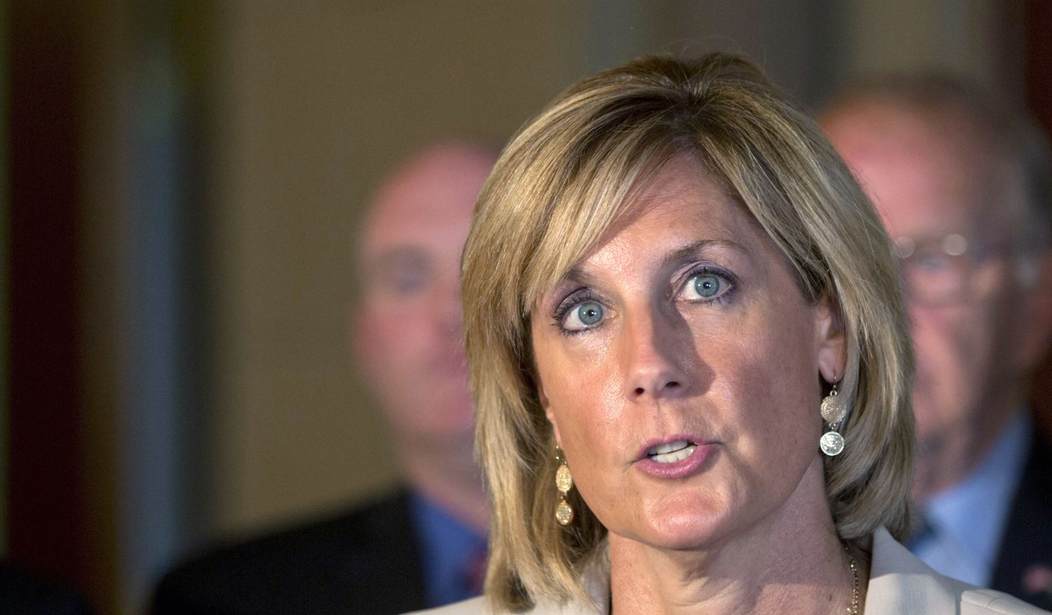Rep. Claudia Tenney (R-NY) wants to put a stop to members of Congress leaving their office early to return to the private sector, likely to a gig as a highly paid lobbyist. She launched the Don't Quit to Lobby Act.
The message is to stay and finish the job. If a person is elected to office, he or she is expected to serve the full term.
There is existing legislation that bans House and Senate members from lobbying for one year and two years respectively from the date they leave Congress. Tenney wants the ban to start from the date the term is supposed to end, even if the member leaves early. Her colleagues in the House would have to honor their commitment to their voters.
'If you are elected to serve a term, we want to make sure that that term is respected,' Tenney told DailyMail.com.
Tenney said she doesn't think lobbying bans should be 'permanent' given 'First Amendment rights,' but the bill would give 'more incentive' to members to stay on through their term.
To members who leave early and cash in, she said: 'you might be exasperated with the job but you signed on to this job. You took an oath of office.'
Tenney insisted her legislation is 'not targeted at any one person, but we just keep seeing this happen over and over and it's not the people just leaving now it's been going on for years.'
The congresswoman is right. There has been a disturbing trend with House members - mostly Republicans - announcing they will not seek re-election and then planning an early exit. The Republican majority is razor thin and has been made more so lately.
Lobbying is lucrative for former politicians. More than 400 ex-members are currently employed as such.
Of the former members of the 115th Congress from 2017-2019, some 60 percent are currently employed by lobbying firms or lobbying clients.
Often, members get around the one-year lobbying ban by joining firms in an 'advisory' role before transitioning to official lobbying when their ban is up.
Her legislation may not be pointed at specific members but it is timely, given the early departures announced by Reps. Ken Buck and Mike Gallagher. Former Speaker Kevin McCarthy announced his early departure in December. Both Buck and Gallagher came under criticism for voting against the impeachment of DHS Secretary Mayorkas.
Gallagher's early departure came as a shock because he chairs a high-profile subcommittee on China. Also, Gallagher's early departure led to calls for him to go ahead and do it immediately so that a deadline for a special election could be met. He plans to resign on April 19.
Under Wisconsin's complicated election law, Gallagher's departure date could have led to two different scenarios.
If he leaves between April 9 and May 14, a special primary and special election will be lumped together with the regular primary on August 13 and the general election on November 5.
When Gallagher resigns on April 19, he will become the sixth House Republica to leave early.
Why is this trend continuing? Some point to a "chaotic" House and low morale.
The tumultuous year in a slim majority hasn’t necessarily pushed departing Republicans to seek higher office or pursue other opportunities away from Capitol Hill. But it reaffirmed for most that they made the right call to leave, that because the House has become more partisan, it is now more difficult to pass legislation that makes an impact than when many were first elected.
The decisions to depart are yet another sign of the broader drop in morale within the GOP conference. Many Republican lawmakers have largely accepted that their inability to govern is a predicament of their own making. They acknowledge that overcoming their legislative impasse relies not only on keeping control of the House in November but also on growing their ranks significantly enough to neutralize the handful of hard-liners who wield influence by taking advantage of the narrow margins. But many also continue to say privately what few have acknowledged publicly: Republicans believe they are likely to lose the majority.
Perhaps. I admit I expect the Republicans to lose the House but my prediction has been shifting a bit lately. I expect Republicans to win a majority in the Senate in November and now I am more hopeful that Republicans can keep the majority in the House. It all depends on Republicans unifying in the House. Right now, the party is too fractured. If Biden and his fellow travelers on the progressive left are to be defeated in November, Republicans have to decide to unite and take them out. Elections have to be won to govern.








Join the conversation as a VIP Member